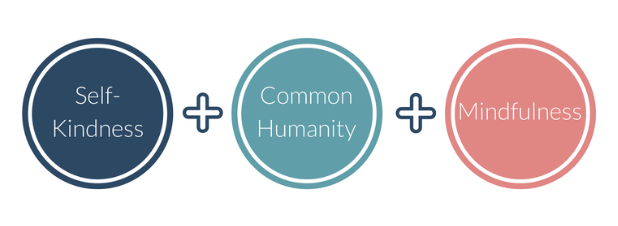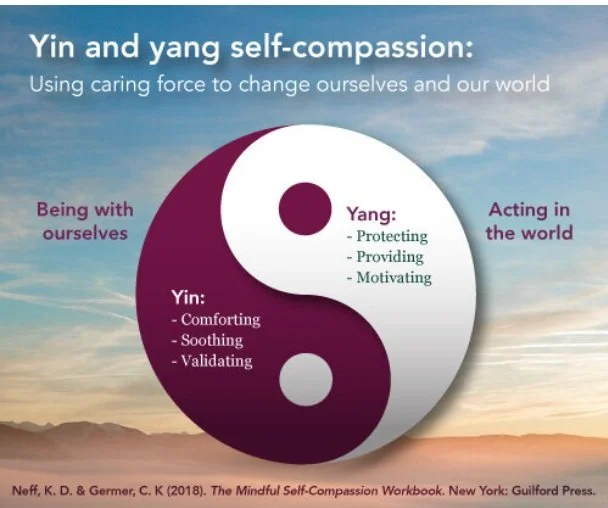Self-Compassion for Healthcare Communities
Self-Compassion Training for Healthcare Communities (SCHC) is a 6-week adaptation of the evidence-based Mindful Self-Compassion (MSC) program created by Kristin Neff, PhD, and Chris Germer, PhD.
Designed specifically for those in healthcare, SCHC helps professionals address the unique stressors of caregiving, including time constraints, workplace culture, and the emotional demands of clinical practice.
Why SCHC?
Healthcare workers give so much of themselves to others. Without tools for self-care, this can lead to burnout, stress, and compassion fatigue. Research on the SCHC program at Dell Children’s Hospital in Austin, TX (2019) showed:
Increased self-compassion, mindfulness, and compassion for others
Greater compassion satisfaction (feeling rewarded by caregiving)
Decreased depression, stress, secondary traumatic stress, and burnout
For a deeper look at the science and background of SCHC, see this published article by Kristin Neff and Marissa Knox (2020), which describes how the program was developed and tested for healthcare professionals.
By weaving mindful self-compassion (MSC) practices into everyday life, healthcare professionals can restore balance, reconnect to their values, and sustain their capacity to care for others.
Who is SCHC for?
This course is open to anyone working in healthcare—nurses, physicians, occupational therapists, counselors, allied health professionals, and support staff. Whether you’re experiencing burnout in healthcare, compassion fatigue, or simply want tools to strengthen your resilience, SCHC Victoria BC provides evidence-based practices that fit into your demanding schedule.
Program Structure
Each week of the SCHC program in BC introduces practical skills tailored to the realities of healthcare work:
Week 1 – What is Self-Compassion?
Explore the definition, physiology, and core practices of self-compassion.Week 2 – Practicing Self-Compassion with Mindfulness
Learn to bring mindfulness and compassion together in daily practice.Week 3 – Burnout: Self-Compassion for Caregiver Fatigue
Address the root causes of burnout and develop self-kindness as a buffer.Week 4 – Discovering Your Compassionate Voice
Cultivate fierce self-compassion to motivate yourself with strength and care.Week 5 – Self-Compassion and Resilience
Practice meeting difficult emotions with balance, courage, and compassion.Week 6 – Making it Count
Reconnect with your core values to guide and sustain your work in healthcare.
Next Course Date:
TBD - Anticipated to offer next SCHC public group in Winter/Spring 2026; For private group bookings for your clinic team, please email hello@youflourish.ca or call 250-999-5095 to discuss.
Fill out this form with your preferred dates/times for future groups & be notified when sign-ups for future cohorts open.
Free practice resources are sent out in weekly emails with include: audio-recorded guidance, instructional handouts, optional additional readings (i.e. research, blogs, worksheets).
MSC and SCHC were developed by Christopher Germer, PhD, a leader in the integration of mindfulness and psychotherapy (www.mindfulselfcompassion.org) and Kristin Neff, PhD, a pioneering researcher in the field of self-compassion (www.self-compassion.org). Not sure if you’d like to take the full MSC curriculum or the SCHC modified version? Check out the MSC webpage or look through the comparison below! Still not sure? Book a Discovery Call.
Mindful Self-Compassion (MSC)
vs
Self-Compassion for Healthcare Communities (SCHC)
The Mindful Self-Compassion (MSC) program, developed by Kristin Neff, PhD, and Chris Germer, PhD, is an empirically supported, 8-week course that combines the skills of mindfulness and self-compassion to enhance emotional resilience and well-being. Since its development in 2010, MSC has been taught worldwide, supported by extensive research linking self-compassion to lower anxiety, depression, and stress, and to greater life satisfaction, resilience, and healthy habits.
While MSC is open to the general public, healthcare professionals face unique challenges—time pressures, exposure to trauma, compassion fatigue, and systemic stressors. To meet this need, Neff, Germer, and colleagues adapted MSC into the Self-Compassion Training for Healthcare Communities (SCHC), a 6-week program specifically designed for healthcare settings.
Key Similarities
Evidence-Based: Both MSC and SCHC are grounded in scientific research and emphasize the three pillars of self-compassion—mindfulness, common humanity, and self-kindness.
Experiential Learning: Both programs balance short talks, guided practices, group sharing, and exercises.
Focus on Daily Application: Both teach tools that can be integrated into everyday life rather than practices that remain on the cushion.
Key Differences
FeatureMindful Self-Compassion (MSC)Self-Compassion for Healthcare Communities (SCHC)Length & Format8-week program (2.5 hrs/week + half-day retreat)6-week program (1 hr/week, no retreat)AudienceGeneral publicHealthcare professionals (nurses, doctors, therapists, allied health, support staff)Curriculum EmphasisIn-depth exploration of all MSC practices, with extended meditation and reflectionFocused, time-sensitive curriculum designed to fit healthcare schedules and address workplace stress directlyContent ThemesBroad well-being focus: mindfulness, compassion, self-criticism, resilience, gratitude, valuesTailored modules on burnout, caregiver fatigue, equanimity, fierce self-compassion, and reconnecting to core healthcare valuesDelivery StyleYin-oriented balance (nurturing, soothing, softening)Yin + Yang emphasis, with practical, action-oriented approaches (protecting, motivating, boundary-setting)Time ConstraintsRequires significant time commitment, which may be difficult for busy professionalsDesigned for shorter, accessible sessions with practices that can be done during the workday (e.g., quick STOP practice, self-compassion break at the bedside)Group DynamicsMixed backgrounds; participants often drawn by interest in meditation, psychology, or wellnessFocus on common humanity in healthcare, creating solidarity across roles and disciplines; helps reduce isolation and stigma around burnout
Why SCHC for Healthcare Workers?
Healthcare workers often operate under relentless pressure, with little time for extended programs. SCHC acknowledges these realities by:
Offering shorter, focused sessions that fit into a demanding clinical schedule.
Framing practices in accessible, non-“touchy-feely” language that resonates with healthcare professionals.
Directly addressing burnout, secondary trauma, and compassion fatigue—challenges rarely named directly in other wellness programs.
Emphasizing fierce self-compassion—the courage to set boundaries, say no, and advocate for oneself and colleagues, in addition to tender self-kindness.
Research Support
Two pilot studies of SCHC (Neff & Knox, 2020) found:
Significant increases in self-compassion, mindfulness, and compassion for others
Decreases in stress, burnout, and secondary traumatic stress
Improvements in compassion satisfaction—the sense of reward that comes from caregiving
Strongest gains among those who began with low self-compassion—the people most at risk of burnout
In Summary
MSC is the “gold standard” for building self-compassion in the general population.
SCHC is a streamlined, healthcare-specific adaptation—retaining the evidence-based practices of MSC while tailoring the program to the culture, time constraints, and emotional realities of healthcare work.
For healthcare workers in Victoria, BC, SCHC offers an accessible entry point into self-compassion, making it possible to strengthen resilience and well-being without needing to step away from professional responsibilities.
Questions?
Check out our frequently asked questions here. Not seeing your question here? Scroll down to send me a message with our question or to arrange a free 15-minute Discovery Call to see if MSC is the right fit for you right now.
-
Absolutely not! You don’t even have to have a formal meditation practice in the course if you don’t wish to - you may focus more on informal (in-the-moment) and behavioural (action-oriented) mindfulness & self-compassion practices.
-
Yes. There is an expectation that you can commit to 30 minutes per day of any mixture of informal and formal practices. If this sounds like a lot, don’t worry. Informal practices often take no extra time at all as they are tools you integrate into what you’re already doing in that moment. As for formal practices, you will be provided with audio guidance to try out the practice we introduce that week in class from your home between sessions.
If you like to delve into the topic more between classes, we also send out weekly summary emails, audio guidance, and corresponding pages if you’d like to buy the Mindful Self Compassion Workbook to accompany the course. This is optional. -
Absolutely! The ever expanding research body is one of the reasons I decided to become a teacher. You can find a list of articles with links to PDFs where there is open access here: https://self-compassion.org/publications-on-msc/
Dr. Kirstin Neff recently wrote a review of the evidence to date in MSC here. -
You can check out an article written by one of the psychologists who created the program here.
You can also purchase the Mindful Self Compassion Workbook or check it out at your local library. -
MSC has been shown to help burnout, particularly with healthcare workers. For a meta-analysis of the studies completed with HCPs since 2020 you can check out this article.
Get in touch.
Please feel free to reach out with questions via this form or set up a free 15-minute discovery call here if you’d like to chat more about MSC!


